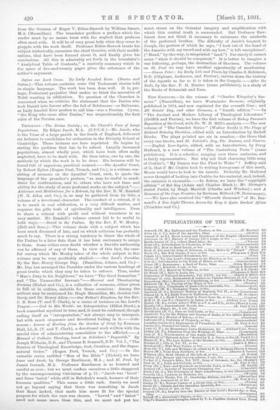THEOLOGY. — The Divine Society ; or, the Church's Care of Large
Populations. By Edgar Jacob, MA. (S.P.C.K.)—Mr. Jacob, who is the Vicar of a largo parish in the South of England, delivered six lectures to candidates for ordination in the Divinity School at Cambridge. These lectures are here reprinted. He begins by stating the problem that has to be solved. Largely increased populations, almost wholly poor, which have been often sadly neglected, have to be dealt with. He then takes, one by one, the methods by which the work is to ho done. His lectures will be found full of sagacious, practical counsel.—The Apostles' Creed, by Robert Eyton (Kogan Paul, Trench, and Co.), is a volume con- sisting of sermons on the Apostles' Creed, such, to quote the language of the preacher's preface, "as may be useful to candi- dates for confirmation, and to others who have not time and ability for the study of more profound works on the subject"— Addresses and Meditations for a Retreat, by the Rev. R. W. Randall (W. H. Allen and Co.), is, as may be gathered from its title, a volume of a devotional character. The conduct of a retreat, if it ia to result in real edification, is a very difficult matter, and requires the gifts both of spirituality and intelligence. Even to share a retreat with profit and without weariness is no easy matter. Mr. Randall's volume cannot fail to be useful in both ways.—David in the Psalms. By the Rev. F. W. Mozley. (Bell and Sons.)—This volume deals with a subject which has been much discussed of late, and on which criticism has probably much to say. There is a strong tendency to throw the whole of the Psalms to a later date than it has been customary to assign to them. Some critics even doubt whether a Davidic authorship can be affirmed of any of them. In view of this fact, the care- ful survey which Mr. Mozley takes of the whole subject in this volume may be very profitably studied.—Gwr Lord's Parables. By the Rev. Henry George Day. (Hamilton, Adams, and Co.)— Mr. Day has arranged the Parables under the various headings of great truths which they may be taken to enforce. Thus, under "Man's Duty to his Neighbour," we have "The Good Samaritan" and "The Unmerciful Servant."—Harvest and Thanksgiving Sermons (Nisbet and Co.), is a collection of sermons, either given in full or in outline, suitable for these occasions. Among the authors may be mentioned Dr. Hugh Macmillan, Mr. Gordon Cal- throp, and Dr. Henry Allon.—Our Father's Kingdom, by the Rev. C. B. Ross (T. and T. Clark), is a series of lectures on the Lord's Prayer.— God in His World an Interpretation (Elliot Stock), a book somewhat mystical in tone, and, it must be confessed, though calling itself an "interpretation," not always easy to interpret, but with much eloquence and devotional feeling in it.—Geth- aomane Leaves of Healing from the Garden of Grief, by Newman Hall, LL.B. (T. and T. Clark), a devotional work written with the special view of administering consolation to the affiieted.—A Manual of Cath,olsc Theology, based on Schieben's " .Dogmatik." By
Joseph Wilhelm, D.D., and Thomas B. Scannell, D.D. "The! Sources of Theological Knowledge, God, Creation, and the Super- natural Order." (Kegan Paul, Trench, and Co.) —In the valuable series entitled "Men of the Bible" (Nisbet), we have Isaac and Jacob, by George Rawlinson, M.A. ; and Si. Paul, by James Iverach, M.A. Professor Rawlinson is as learned and careful as over ; but we must confess ourselves a little staggered by the uncompromising Calvinism of p. '71 "Jacob was `loved and Esau hated while still in Rebekah's womb, because of their foreseen qualities." This seems a little rash. Surely we need not go beyond saying that there was something in Jacob that Esau lacked, that made him more fit for the special purpose for which the race was chosen. "Loved" and " hated " need not moan more than this, and we must not put too
much stress on the Oriental imagery and amplification with which this central truth is surrounded. But Professor Raw- lins= does not think it necessary to extenuate the misdeeds of the preferred brother. The difficulty of Jacob's bequest to. Joseph, the portion of which he says, "I took out of the hand of the Amorite with my sword and with my bow," is left unexplainee. (" Hand," by-the-way, is misprinted "land.") For surely it cannot mean "when it should be conquered." It is better to imagine a. war following, perhaps, the destruction of Shoehorn. The volume on St. Punkt we may have another opportunity of mentioning —Simon Peter : his Bark/ Life and Times, by Charles S. Robinson, D.D. (Oliphant, Anderson, and Ferrier), carries down the history of the Apostle as far as it is taken in the Gospels. —After the Exile, by the Rev. P. H. Hunter (same publishers), is a study of the Books of Nehemiah and Ezra.


































 Previous page
Previous page